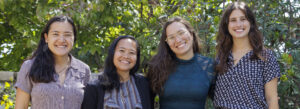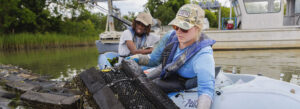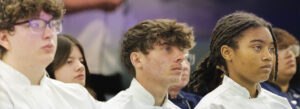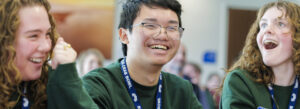Science and stewardship: VATIDES program makes science meaningful for K-12 students
Checking the water quality of a local creek or identifying wildlife at a nearby marsh can make for an engaging science class—but these immersive out-of-the-classroom activities also help K-12 students carry forward lessons in environmental stewardship long after the end of the semester.
Virginia K-12 students must complete these environmental investigations, known as Meaningful Watershed Educational Experiences (MWEEs), at least three times—once in grade school, middle school, and high school. A program called Virginia Teachers Innovating and Designing Experiential Science (VATIDES), led by education specialists from the Chesapeake Bay National Estuarine Research Reserve and the Virginia Institute of Marine Science Marine Advisory Program, provides teachers-in-training with instruction in how to plan and lead these activities.
This year, the education specialists from the VATIDES program will lead MWEE training for more than 60 education students in MWEE training. During the fall, these pre-service teachers completed three training modules during their education classes and will create their own MWEE plans in groups. In the spring semester, they will complete additional webinars and participate in a virtual networking event. The program is funded through the NOAA Bay Watershed Education and Training (B-WET) program to increase capacity in watershed education programs in the Chesapeake Bay Watershed.
“The teachers will be the ones to implement these lessons, but not all of them have the training or feel confident in doing that,” said Lisa Lawrence, a VIMS MAP education specialist and Virginia Sea Grant extension agent. “By training them as pre-service teachers, we can show them how to lead MWEEs so they can incorporate them into their teaching from the get-go. Hopefully we can get more of those MWEEs happening at all levels for K-12 students in Virginia.”
Research shows that project-based learning like MWEEs engage K-12 students in real-world issues, teach them collaboration and critical-thinking skills, while still meeting curriculum standards. But teachers may opt not to plan these types of lessons due to time or money constraints, or because they may not have a background in science.
“A lot of elementary teachers aren’t very confident in teaching science, especially teaching science outdoors,” said Bill McConnell, director of teacher education at Virginia Wesleyan University. “When I think about who most needs this type of training, I think elementary. That’s who I have in this class, is a bunch of elementary educators and one special educator.”
The 63 education student participants are enrolled in programs at James Madison University, Virginia Wesleyan University, Virginia Commonwealth University, and the William & Mary School of Education. Some of the pre-service teachers in the VATIDES will begin student teaching as soon as next semester, while others are undergraduate students learning the fundamentals of education—but all will leave their classes ready to lead a Meaningful Watershed Educational Experience with their students.
Each MWEE consists of four parts: defining the issue, conducting an outdoor investigation, drawing conclusions based on results, and action project based on what they find. These watershed investigations can be incorporated across a range of topic areas in physics, chemistry, biology, and environmental science.
“A lot of elementary teachers aren’t very confident in teaching science, especially teaching science outdoors,” said Bill McConnell, director of teacher education at Virginia Wesleyan University.
Each MWEE consists of four parts: defining the issue, conducting an outdoor investigation, drawing conclusions based on results, and action project based on what they find.
“Students investigating water quality at a creek might notice there’s a lot of rain that’s coming right off of the pavement and into the stream,” said Elise Trelegan, Bay Watershed Education and Training Program Coordinator for the NOAA Chesapeake Bay Office. “The action project for that could be an anti-idling campaign or installing a riparian buffer near the stream. It’s not just being able to recite information for a test, but how you can apply that learning to make change in your school yard or your community.”
As part of the VATIDES program, the pre-service teachers will collaborate in groups to develop their own MWEEs as part of their coursework and participate in a summit meeting in the spring to present their projects and network with other pre-service teachers. Their education professors have also built MWEE training into their courses so they can continue this training for future classes. Elizabeth Edmonson, a principle investigator for several science education projects at Virginia Commonwealth University, has incorporated the MWEE learning modules into her class about science methods for secondary education.
“This shows teachers that they can take kids outdoors and get them invested in their natural environment, and I think that’s really important,” Edmonson said. “We’ve talked about taking students on field trips, but I never taught the part about advocacy work and helping students become advocates for issues that they think are important for their community. This program gives them a nice framework for that.”
Takeaways:
- The VATIDES program shows pre-service teachers in Virginia how to lead their students in meaningful watershed educational experiences (MWEEs).
- Each MWEE consists of an outdoor science investigation and a follow-up action project, and can be used to teach many concepts in biology, chemistry, and physics classes.
- By training pre-service teachers, the VATIDES program ensures teachers are equipped to lead meaningful science lessons for their students.
Photos provided by Sarah McGuire Nuss | CBNERR
Video by Aileen Devlin | Virginia Sea Grant
Story by Madeleine Jepsen | Virginia Sea Grant
Published July 9, 2021.
“It’s not just being able to recite information for a test, but how you can apply that learning to make change in your school yard or your community,” Trelegan said.





